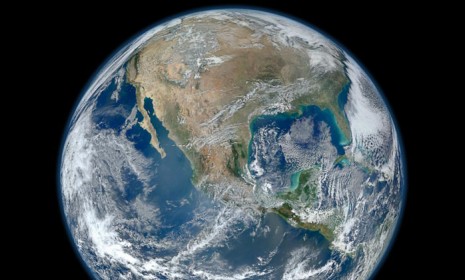Has mankind outgrown Earth?
Humans are using up the planet's resources at a frighteningly unsustainable rate, according to a new report from the World Wildlife Fund

A free daily email with the biggest news stories of the day – and the best features from TheWeek.com
You are now subscribed
Your newsletter sign-up was successful
We're gobbling up the planet's resources at such an alarming rate that by 2030, even a second Earth wouldn't be enough to sustain us, claims the World Wildlife Fund's (WWF) 2012 Living Planet Report. The research will be presented next month at a United Nations conference in Rio de Janero, where world leaders will walk the delicate tightrope of trying to figure out how to help the world's poorest countries without doing further damage to the environment. Here's what you should know about the eye-opening study:
Which resources are we depleting?
Renewables like fish, water, timber, and food are being used up much faster than previously thought. According to experts, mankind's "ecological footprint" is now over 50 percent higher than it was in 2008, meaning it takes 1.5 years for Earth to regenerate the natural resources we use up annually. Think of it like a bank account, WWF-UK chief executive David Nussbaum tells Britain's Telegraph. If you continually overspend, "you eat into your savings until there's nothing left." That's what we're doing to Earth.
The Week
Escape your echo chamber. Get the facts behind the news, plus analysis from multiple perspectives.

Sign up for The Week's Free Newsletters
From our morning news briefing to a weekly Good News Newsletter, get the best of The Week delivered directly to your inbox.
From our morning news briefing to a weekly Good News Newsletter, get the best of The Week delivered directly to your inbox.
How did the WWF figure this out?
The report cobbled together international data, most notably from the world's top 10 polluting countries, says CNN. The list of nations is headed by Qatar, Kuwait, and the United Arab Emirates, with Denmark, Belgium, and the United States not far behind. Australia, Canada, the Netherlands, and Ireland fill out the 10 worst offenders. "Countries are ranked on their consumption of renewable resources versus their biocapacity, or ability to produce renewable resources and absorb CO2 emissions." High-income nations have the biggest ecological footprints, consuming as much as five times more resources than low-income countries.
Why is our ecological footprint growing?
The world's population, which according to the U.N. surpassed 7 billion last October, is getting too big, and the average individual is using more than he or she needs. "The excessive demands that we are putting on the planet will inevitably lead to acute water shortages, a chronic food crisis, and rising prices for energy, metals, and minerals," says Robert Walker at the Huffington Post.
A free daily email with the biggest news stories of the day – and the best features from TheWeek.com
What else did the study show?
The Living Planet Report suggests that the Earth's biodiversity has declined 28 percent from 1970 to 2008. Freshwater fish saw the worst losses at 70 percent, due to added pressures from the fishing industry.
Is there any hope?
Experts say that there are indeed ways for humans to live within the planet's means while still getting the food, water, and energy needed for a growing global population. Farmers in Pakistan, for example, have developed a technique to grow cotton using 37 percent less water, 40 percent less chemical fertilizer, and 47 percent less pesticides than other growers, while still maintaining their yields. Solutions like these "are needed to tackle the amount of water used by agriculture, reduce food waste, and improve energy efficiency," says the Telegraph. If we're to actually succeed, the dire situation needs to be addressed with "the same urgency and determination that [governments and business] put into dealing with the financial crisis."
Sources: Businessweek, CNN, Huffington Post, Telegraph


